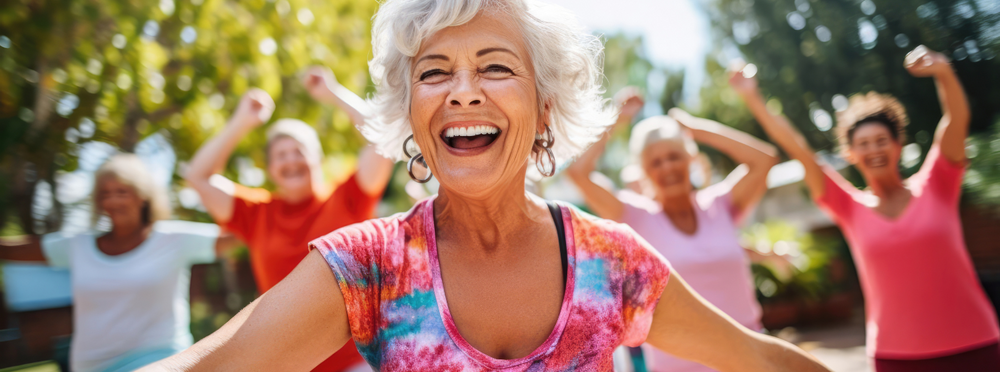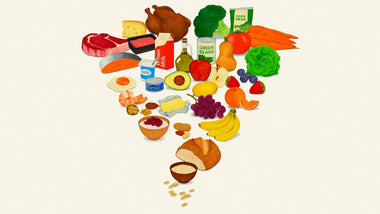Menopause and the Big Lie: Part 5

Menopause represents a significant physiological transition that each woman will experience differently. Some are incapacitated by the decline in hormone levels. Others barely notice the change. Most are in between. But there is no question that our bodies are left different. Weight gain is easier. Wrinkles appear out of nowhere. Bones become brittle. Cholesterol shoots up.
Having said all that, it is a misconception that postmenopausal women have no influence over our outcomes or our overall sense of well-being.
The previous four blogs dealt with our main pharmacologic option, hormone replacement therapy (HRT). And there is plenty of evidence that HRT would likely be a net positive for many more women than are being offered this intervention today. If you missed those blogs you can find them here: Part 1, Part 2, Part 3 and Part 4.
However, there is much more we can do than just demand to be placed on drugs! We can also help ourselves get through this period and set ourselves up for better health long term through the way we live.
Spoiler alert: If you’re a regular reader of our blogs, you will see a striking similarity to advice I have given many times before. Turns out, eating right and exercising regularly has a positive impact, regardless of what we are trying to impact positively.
Mediterranean Diet and Menopausal Symptomatology
The Mediterranean diet, characterized by high consumption of fruits, vegetables, whole grains, legumes, nuts, and olive oil, has been associated with reduced severity of menopausal symptoms. A study involving more than 6,000 postmenopausal women over nine years found that higher adherence to the Mediterranean Diet correlated with a lower incidence of hot flashes and night sweats.
Phytoestrogens: Plant-Derived Estrogenic Compounds
Phytoestrogens, particularly isoflavones found in soy products, have been investigated for their potential to mitigate menopausal symptoms due to their structural similarity to estradiol. Randomized studies have shown that phytoestrogen-based treatments may reduce the frequency of hot flashes and night sweats. However, efficacy varies among individuals, possibly due to differences in gut microbiome composition affecting isoflavone metabolism.
By the way, the idea that phytoestrogens increase breast cancer risk has been summarily debunked. Even women who have gone through breast cancer treatment can enjoy soy products.
Omega-3 Fatty Acids and Mood Regulation
The decline in estrogen during menopause is associated with an increased risk of depression. Omega-3 fatty acids, like those found in Step One Foods, are known to have positive effects on mood and higher dietary intake of omega-3 fatty acids has been inversely associated with depression prevalence in postmenopausal women.
Micronutrients: Calcium and Vitamin D
Postmenopausal women are at increased risk for osteoporosis and adequate intake of calcium and vitamin D becomes crucial for bone health. For women over 50, the recommended daily allowance includes 1,200 mg of calcium and 600–800 IU of vitamin D. Individual vitamin D requirements may be higher in order to keep vitamin D levels in the normal range. You can have your vitamin D level assessed through a simple blood test.
Dietary sources of calcium include dairy products, leafy greens, and fortified foods, while sunlight exposure facilitates endogenous vitamin D synthesis. It is typically difficult to get adequate amounts of vitamin D through diet alone - although eating mushrooms can help.
Exercise: Bone Strength and Beyond
If there was any time in a woman’s life when staying physically active was critical, it’s after menopause. We can take all sorts of calcium supplements but unless we engage in weight bearing and resistance training all that calcium will just go toward making kidney stones. And unless we expend more energy, the slowdown in metabolism most women experience during this time will yield progressive weight gain. The good news is that we don’t need to engage in extreme or exceedingly strenuous routines to see meaningful health gains.
For optimal metabolic health, spending the majority of our time in Zone 2 is ideal. This exercise level helps build aerobic capacity, increases mitochondrial efficiency, burns fat for energy, increases insulin sensitivity, and helps lower blood pressure. Interspersing short, high-intensity intervals is also a good idea to help build cardiovascular fitness.
And how do you know if you’re in Zone 2? To estimate your Zone 2 heart rate range, subtract your age from 220 (this estimates your maximum predicted heart rate), and then multiply that number by 0.6 to get the lower range (60%) of Zone 2, and by 0.7 to get the upper range (70%). You can also know that you’re in Zone 2 by using the talk test: your exercise intensity is low enough that you can carry on a conversation, but high enough that you’re somewhat breathless and can’t sing.
And what about resistance training? Do that at least a couple times a week for 30 minutes at a time. You can get fancy and work with a trainer at a gym - or make a minor investment in resistance bands and follow a do-it-yourself program at home.
We Have the Power!
Menopause is a time of tremendous change - physically and psychologically. But it’s definitely not a time to suffer in silence or simply accept our fates. Helping ourselves through nutrition and physical activity (the EXACT SAME interventions as the ones that yield cholesterol improvements) will go a long way to maximizing overall health outcomes, especially after our estrogen is gone. And, for most women, HRT - whether systemic or local - can be considered a safe, effective and in many ways pro-active step to ensuring a smoother transition to the second half of our lives.
The WHI deprived too many women of quality of life for too long.
It’s time to move on.
About Step One Foods: Step One Foods offers convenient, scientifically-formulated foods clinically validated to rapidly reduce cholesterol and improve cardiometabolic health. Real food. Real results. Unapologetically delicious. Learn more at steponefoods.com.

Tested & Proven Results.
- Cardiologist formulated
- Supported by over 500 publications
- Clinically-proven, in a double-blind randomized trial with Mayo Clinic and The University of Manitoba
80% of participants lowered their cholesterol in just 30 days. With just two servings per day, Step One Foods offers a proven-effective way to naturally lower LDL (bad) cholesterol.
Get heart health tips and articles like this, delivered right to your email.
New articles every week.
You may also like...

The New Food Pyramid: What It Gets Right (and What It Misses)

Why Most New Year’s Resolutions Fail - And How to Right-Size Yours

You don’t need to avoid foods with cholesterol…except for these


